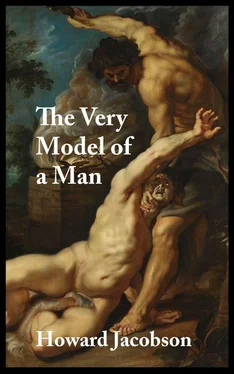Raising a hand is another matter. Raising a hand can be soundless, unadmitted, loving.
I loved Abel. Forty thousand seraphim could not with all their love put together, not with their eighty thousand nostrils opening and closing in unison to inhale the sweet smells that issued from his offering, have loved him more. I even loved him while he made his offerings, and felt protective of the very sacrificial diligence that divided us. You do not have to approve the service to feel tender to the servant. The very opposite may be true: that you grieve and sorrow over the officiant in exact proportion as you despise the ceremony. The more abominable the paraphernalia of sacrifice became to me — the more I grew to hate the punctilios of selection, the time and spirit expended on precautions, the blood, the fires, the smoke, the charred aroma — the more touching I found Abel’s dedication.
I would have needed to be an animal myself not to have been moved by the sight of him crawling among his flock, feeling between haunches and through fleece for that taint or blemish which, once found, disqualified the beast from God’s table. It is a test of love to see your brother on his back beneath a ram, and I passed it. I watched him in the field, minding ordinances, and I wept for him. I could scarcely hear above the beating of my own heart when I caught him severing a carcass, not with any of that eager anticipation of pleasure that could make slaughter such a sociable activity, but in strict obedience to prescription — his lips pursed, his knuckles white, his whole frame tensed and tipped, as though the effort of concentration required to celebrate the glory of God in one act of meticulous butchery after another would at any moment prove too much for his balance.
Not that he ever did fall. That capacity for still, self-punishing stupor that had held him ensorcelled in his sea-shells as a child kept him faithful and upright now, no matter how much smoke was blown back into his blackened face.
You are changing colour, I warned him. You were not told you had to sacrifice your fairness to God.
It washes off, he said.
(Of itself, ‘it’ did not do anything. The washing-off was seen to by my mother.)
You are damaging your skin, I persisted. You are ruining your eyes. You are breathing in filth.
I don’t feel damaged, he said.
I’m not talking about what you feel. I know what you feel. I’m talking about what I can see.
You’re not, he said. You’re talking about what you feel.
I was always proud of him when he was clever. And surprised by him. Had he been clever every day I would still have been surprised. He was younger than me. I had watched over him all his life. I had mounted guard over all his intellectual entrances and exits. Whatever was handed to him or taken from him had to pass by me. I checked everything in and out. Hence my surprise when he delivered himself of a thought or an opinion which I had not logged. Family surprise: that ultimately unshakable disbelief in the virtues and intelligence of those to whom you are related, by blood.
I was proud of him, I still maintain, though I can see that my pride was blemished — had it been one of Abel’s rams he would not have selected it as an offering to the Lord.
Of course he was right: when I complained of the damage officiation was doing to his health, it was my own health I was thinking of. His conscientiousness made me ill. Not because I saw it as a reproach to my negligence, but because the repetition and monotony of it set up a sort of drone of drudgery around me. Every morning the same carnage, the same terror in his flock, the same roaring and bellowing, the same sour smell of intestines, and the same songs of adoration. Every morning the pall of incense funnelling to the heavens. Every morning the sounds of celestial inhalation, the sniffing of the spheres.
But this regularity of death and prayer, gore and gratitude, constituted only the tangible part of the turmoil to which I was subjected. Worse was the emotional agitation — the mental buzz of faith and worship. I mean the atmosphere of piety, the rapt expressions, the consciousness of grace, those vibrations in the ether — rhythmic and persistent enough to turn your brain — which tell you that spiritual exercise is in train, that callisthenics of the soul are being practised, thunderous in their silence, under your very nose.
So why did I stay to be unnerved? Why did I hover around the service when I could easily have found another and more remote garden to defoliate, and been about my business far from all knowledge, far at least from all witness, of his?
Because I was maddened by his concentration, and galled by how completely it negated my concerns. Do I mean I was jealous of the relations he enjoyed with Him — the great Separater and Divider, of waters and of men? No. Do I mean I was jealous of his freedom from jealousy? No. Do I mean I was jealous of his capacity to feign freedom from jealousy? Perhaps I do mean that. But it should be clear by now why I had to stay. Had I decamped in the circumstances that prevailed, it would have seemed like a banishment — him expelling me.
You are in danger, I warned him, of becoming monomaniacal.
He couldn’t hear me.
One of these days you will be sucked up, I said, in your own column of smoke.
He threw me a look, as though to ask, Would that be so bad?
Should I have answered, Yes, it would be so bad, because in that case I would miss you?
It was easy enough for me to imagine him rising, slowly spinning in the eye of a benign tornado. I had been preparing his departure ever since his arrival. There was no form of leaving that I had not rehearsed for him. I knew how he would look drowned, choked, charred, crumbled. I sank him in quicksand, hanged him, starved him, dipped him repeatedly in boiling fat. Ascent was simple to arrange. One, two, three… and he was up, his tunic billowing, the soles of his feet foreshortening, losing their definition, losing their graceful incurvations, entering the same plane as the rest of him before disappearing at last into cloud.
This I could do, yet saying I would miss him was beyond me. Ours was not a family that gracefully expressed intimacies. We were harsh, in the image of a God who didn’t dare trust His affections.
Anyone would think, I said, that you keep animals only in order to burn them.
Anyone would think you have no sublunary obligations.
Anyone would think you have no one else to talk to.
Anyone would think you have something in particular to thank Him for.
Anyone would think He was the one that carried you in His belly and washes between your toes.
Anyone would think He was the one that watched over you in the night to be sure you were still breathing.
Anyone would think…
I kept it up for weeks, months. I squatted in the bloodied dirt, raking the never cold, always crimsoned ashes, pricking the ground with splintered bone, pricking him with the rage of my exclusion.
Anyone would think you were put on earth for no other reason than to spirit yourself off it.
Anyone would think you preferred There to here, Him to us (I didn’t risk saying me), Death to life.
Life? The movement of his pale lips was clear in its meaning. Life? Since when was I a champion of that sentimental entity?
Since when? Since yesterday. Since morning. Since that very second. When you are in the business of goading a brother who goads you with silence and self-sufficiency, you have to be opportunistic. If I could rattle him with life, I would not let squeamishness stop me. Besides, I was a lifer in this sense: I abhorred the earth so violently that anything was preferable to the idea of a long lying in it. And life was the sole alternative to death that had so far been granted to our comprehension.
Читать дальше











